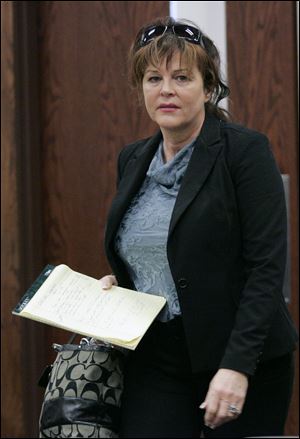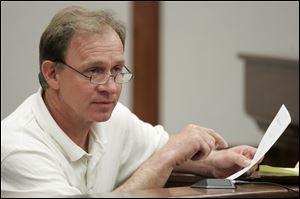
Witnesses say horses fed frequently on Vess' farm
4/30/2010
Megan Stover looks over photos during testimony in Port Clinton. Ms. Stover worked for Robin Vess until November and said she called the Humane Society of Ottawa County in January.
The Blade/Dave Zapotosky
Buy This Image
PORT CLINTON - Three former workers at the farm of Robin Vess, who's accused of starving dozens of horses, testified in court yesterday that the animals were fed on a regular basis, but they said the animals seemed to have lost weight in the winter months.
Megan Stover, Tim Stayancho, and Daniel Majers, who said he regularly helped out on the farm for free, told jurors in Ottawa County Municipal Court that they fed the horses frequently.
The witnesses were among 11 called for the defense of Ms. Vess of Oak Harbor, who's facing 42 counts of animal cruelty.
However, Ms. Stover - who said she worked on Ms. Vess' farm until the end of November - and Mr. Majers also told the court they had called the Humane Society of Ottawa County in January because they were worried about the horses' health. Members of the Human Society have said they visited Ms. Vess' farm on Jan. 29 and removed the horses after receiving two anonymous phone calls.

Robin Vess, above, was too depressed to care for her horses, her defense attorney says.
Ms. Stover described Ms. Vess as a "neat freak" about the care of her horses, and said she fed the animals three times a day based on the instructions from Ms. Vess. But Ms. Stover said she noticed the horses were "a little underweight" last winter and, under questioning from assistant prosecutor Andrew Bigler, admitted calling the Humane Society to express concern about the ani-mals' condition on Jan. 29 - the day they were removed from Ms. Vess' farm.
Mr. Majers said he called the Humane Society because he "felt there were horses that needed medical attention or something done with them."
In other testimony yesterday, three men said they had sold hay and other horse feed to Ms. Vess or her employees.
One of the witnesses, Michael Lenke of Oak Harbor, said he sold 1,200 bales of hay to Ms. Vess between August and January, which he dropped off at her farm.

John Gruenhagen was one of three men who testified for the defense that they supplied Robin Vess with hay for her horses.
Jeff Phillips of Fremont, who works at a drive-through store selling grain, said he sold horse feed in January to people he believes were Ms. Vess' employees.
And a third man, John Gruenhagen of Napoleon, recalled supplying Ms. Vess with hay in August and January. He said a woman from Texas paid for the hay supplied in January via an anonymous $500 wire transfer to his account.
Two longtime friends of Ms. Vess also testified.
Joe Botek, a neighbor, said he bought grain for Ms. Vess in January because "she was kinda low on money." However, he told prosecutors he was unable to produce receipts for the purchases.
Tina Burkhart, who runs her own horse farm, said she has known Ms. Vess for 13 years. She said she had been working with a horse rescue organization, the Arabian Rescue Mission, since September to try to find homes for some of the horses. She said she had also bought some of Ms. Vess' horses herself.
In an interview published April 11 in The Blade, Ms. Burkhart said she became worried about some of the horses she co-owned with Ms. Vess after she realized her friend was suffering from depression. She described the horses as "in bad shape" and said she bought four of them and paid Ms. Vess over time in the hope that she would buy hay.
But in testimony yesterday, Ms. Burkhart denied she bought the horses because she was concerned for Ms. Vess' ability to care for them. She told prosecutors she had meant to tell The Blade the horses were "out of show shape."
Looking at the prosecution's photographs of some of Ms. Vess' horses, Ms. Burkhart called two of them "too fat" and said they were out of shape. She rated another as having good body condition.
In testimony Wednesday, two veterinarians who assessed the horses at Ms. Vess' farm on Jan. 29 said the whole herd was underweight, most likely because they were malnourished.
In other testimony, a veterinarian from Iowa with experience in horse rescue backed up arguments made by the defense that Ms. Vess' horses could have been suffering from medical conditions that caused them to be thin.
Dr. Kim Houlding told the court the animals also could have been sick because of toxic feed. However, when challenged by the prosecution, Dr. Houlding said she could not determine what caused the horses to be thin without conducting medical tests. She also said she had not personally assessed Ms. Vess' horses or visited her farm.
Dr. Houlding criticized the Humane Society's decision to move Ms. Vess' horses to the Sandusky County Fairgrounds, explaining that it could have caused the already fragile animals too much stress.
"If the horses are in marginal condition it's better to bring food to the horses than to move the horses," Dr. Houlding said.
Terry Figueroa, who heads the Arabian Rescue Mission, also took the witness stand yesterday and accused the Humane Society of starving Ms. Vess' horses while they were at the fairgrounds.
Ms. Vess' attorney, Mark Davis, said he plans to bring in two more witnesses today to testify in Ms. Vess' defense. He said Ms. Vess herself probably will not testify.
Contact Claudia Boyd-Barrett at:
cbarrett@theblade.com
or 419-724-6272.